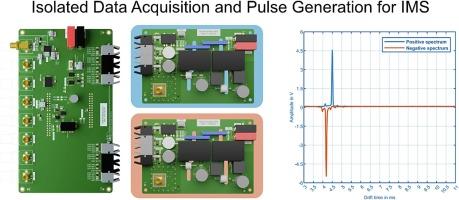An open source isolated data acquisition with trigger pulse generation for ion mobility spectrometry
IF 2
Q3 ENGINEERING, ELECTRICAL & ELECTRONIC
引用次数: 0
Abstract
Ion mobility spectrometers (IMS) are used in a wide variety of applications, including trace gas detection in safety and security applications, but also in more analytical applications, e.g., in medicine or food quality monitoring. Consequently, IMS are often coupled with other separation techniques and laboratory equipment, requiring synchronization between the external equipment and the IMS electronics. In addition, IMS and the associated electronics are becoming increasingly complex due to ongoing instrumental developments. In this work, we present an open source data acquisition hardware tailored to the requirements of advanced IMS, but also applicable to other applications. The data acquisition hardware provides trigger pulses for synchronized operation of the IMS ion gate or external devices. In addition, the data acquisition hardware allows for parallel digitalization using two isolated 16-bit analog-to-digital converters (ADC) with up to 250 kilosamples per second. The galvanically isolated trigger input ensures a synchronized start of the IMS measurements, particularly when connecting external instrumentation such as a gas chromatograph. Furthermore, due to the isolated ADCs, the hardware allows great flexibility in defining the ground potential of the instrument setup.

用于离子迁移率光谱仪的带触发脉冲生成功能的开放源码隔离式数据采集器
离子迁移谱仪(IMS)应用广泛,包括安全和安保应用中的痕量气体检测,以及更多的分析应用,如医药或食品质量监测。因此,IMS 通常与其他分离技术和实验室设备结合使用,这就要求外部设备与 IMS 电子设备同步。此外,由于仪器的不断发展,IMS 和相关电子设备也变得越来越复杂。在这项工作中,我们介绍了一种开源数据采集硬件,它是根据先进 IMS 的要求定制的,但也适用于其他应用。数据采集硬件为 IMS 离子门或外部设备的同步操作提供触发脉冲。此外,数据采集硬件还允许使用两个隔离的 16 位模数转换器(ADC)进行并行数字化,采样率高达每秒 250 千次。电隔离触发输入可确保同步启动 IMS 测量,特别是在连接气相色谱仪等外部仪器时。此外,由于 ADC 是隔离的,因此硬件在定义仪器设置的接地电位时具有极大的灵活性。
本文章由计算机程序翻译,如有差异,请以英文原文为准。
求助全文
约1分钟内获得全文
求助全文
来源期刊

HardwareX
Engineering-Industrial and Manufacturing Engineering
CiteScore
4.10
自引率
18.20%
发文量
124
审稿时长
24 weeks
期刊介绍:
HardwareX is an open access journal established to promote free and open source designing, building and customizing of scientific infrastructure (hardware). HardwareX aims to recognize researchers for the time and effort in developing scientific infrastructure while providing end-users with sufficient information to replicate and validate the advances presented. HardwareX is open to input from all scientific, technological and medical disciplines. Scientific infrastructure will be interpreted in the broadest sense. Including hardware modifications to existing infrastructure, sensors and tools that perform measurements and other functions outside of the traditional lab setting (such as wearables, air/water quality sensors, and low cost alternatives to existing tools), and the creation of wholly new tools for either standard or novel laboratory tasks. Authors are encouraged to submit hardware developments that address all aspects of science, not only the final measurement, for example, enhancements in sample preparation and handling, user safety, and quality control. The use of distributed digital manufacturing strategies (e.g. 3-D printing) is encouraged. All designs must be submitted under an open hardware license.
 求助内容:
求助内容: 应助结果提醒方式:
应助结果提醒方式:


